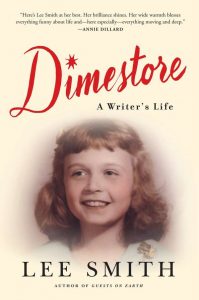Also a big fan of Lee Smith, I reviewed this book earlier for the Greensboro News & Record: http://www.greensboro.com/go_triad/arts/books/review-dimestore-a-writer-s-life/article_f691fad4-cd46-5b96-9c54-3269b6c73c98.html
Not to be outdone, Bob Moyer has reviewed it for Briar Patch Books. Such a fine book merits a lot of attention.
Reviewed by Robert P. Moyer
DIMESTORE. By Lee Smith. Algonquin Books. 202 pages. $24.95.
 Charming. Lee Smith can be many things as a writer, but one characteristic carries throughout her work. Charming, like this story of a little girl whose daddy owned a dimestore in Grundy, Va.
Charming. Lee Smith can be many things as a writer, but one characteristic carries throughout her work. Charming, like this story of a little girl whose daddy owned a dimestore in Grundy, Va.
It’s there, behind the one-way window looking down on the sales floor that she took away what might have been her first lesson as a writer — “Nobody can see me, but I can see everybody… Thus I learned the position of the omniscient narrator, who sees and records everything yet is never visible.”
She goes on to catalogue other such moments in the context of her small-town life, like the lesson she learned from the movies where “…we grimly held our dates’ hands in a kind of death grip throughout the whole show”: “The movies taught me that place can be almost as important as personality, and that actions really do speak louder than words.” Story after story comes to her falling “…asleep on somebody’s lap … hearing those stories, told by somebody that loved me, so that my sense of a story is still very personal.” It seems an ideal education for a writer.
Including the parts that were not “charming.” Her mother suffered from “bad nerves” and “nervous stomach’; her father was “kindly nervous,” a euphemism for bipolar. They were periodically hospitalized, and Smith spent some time and summers with family, in one case, learning to be a lady. Of course, she wanted to be a boy. Concerned for some time that she, too, might suffer such frailties, she escaped the mountains to college.
Or so she thought. It was there she bumped into writers like Eudora Welty, who showed her “Plain stories about country people and small towns—my own ‘living world.’” That awakening led her to her métier: “…the mountains that used to imprison me have become my chosen stalking ground.”
This book abounds with moments high and low that lead to small personal epiphanies, all lessons we have experienced in her many books. Smith shares with us how her life, like the trip down the Mississippi she took with a group of college friends on a raft, “…has turned out to be wild and various, full of the unexpected, and it’s a monstrous big river out here.” As those of us who have read many of her books know, writing for her “… is about our own real world and our own real lives and understanding what happens to us day by day; it is about playing with children and listening to old people.”
So is this concise, charming memoir.